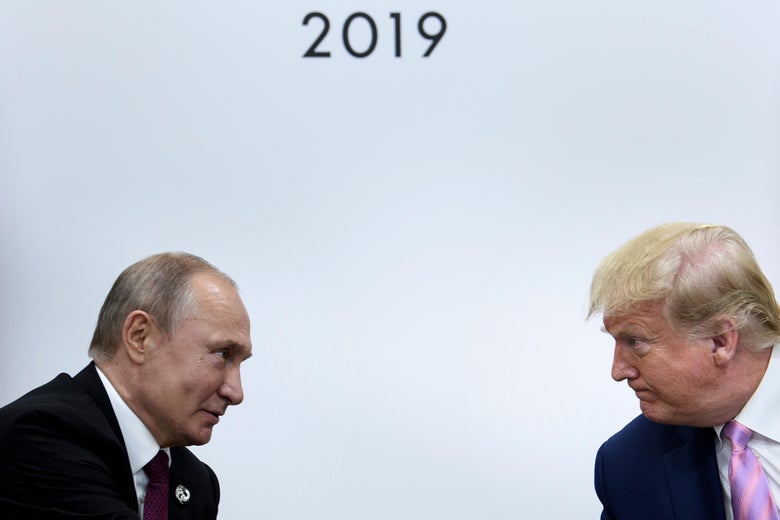
President Donald Trump attends a meeting with Russia’s President Vladimir Putin during the G20 summit in Osaka on June 28, 2019.
BRENDAN SMIALOWSKI/Getty Images
It wasn’t just about Ukraine. Before President Donald Trump’s July conversation with Ukraine’s leader, the administration had already made it a common practice to limit access to the commander in chief’s phone calls with other world leaders. Specifically, the White House locked down access to calls with Saudi Crown Prince Mohammed bin Salman and Russian President Vladimir Putin, two leaders who have notably controversial relationships with Trump. In order to limit who could see reconstructed transcripts of these delicate calls, the White House placed the documents in a highly classified computer system that is generally reserved for the nation’s most sensitive national security secrets.
Although not necessarily surprising, the revelations, which were first reported by CNN and then confirmed by others, shows that there was a pattern of trying to limit access to calls that were sensitive and could make Trump look bad. That is precisely what the whistleblower accused the administration of doing when it said officials were trying to “lock down” access to information about the July 25 call Trump held with Ukraine’s Volodymyr Zelensky. The complaint said that the Ukraine call did not mark the first time the administration went to such extraordinary lengths “solely for the purpose of protecting political sensitive—rather than national security sensitive — information.” The New York Times explains how it all began:
The practice began after details of Mr. Trump’s Oval Office discussion with the Russian foreign minister, Sergey V. Lavrov, leaked to the news media, leading to questions of whether the president had released classified information, according to multiple current and former officials. The White House was particularly upset when the news media reported that Mr. Trump had called James B. Comey, the former F.B.I. director, a “nut job” during that same meeting, according to current and former officials.
The White House had begun restricting access to information after initial leaks of Mr. Trump’s calls with the leaders of Mexico and Australia. But the conversation with Mr. Lavrov and Sergey I. Kislyak, then the Russian ambassador to the United States, prompted tighter restrictions.
Readers like you make our work possible. Help us continue to provide the reporting, commentary and criticism you won’t find anywhere else.
Join Slate Plusfrom Slate Magazine https://ift.tt/2o42mna
via IFTTT
沒有留言:
張貼留言